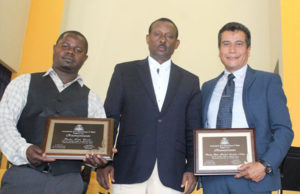Tijuana churches expand ministry to immigrants
TIJUANA, Mexico—Churches and ministries in the Tijuana area that ministered to Haitian immigrants seeking to cross the border into the United States saw their labor bear fruit, and now the recipients of that ministry want to help Central American immigrants.
Primera Iglesia Bautista in Tijuana opened its doors in October 2016 to Haitian immigrants who began arriving at the border crossing seven months earlier, said the church’s pastor, Juan Cerrano.
The Tijuana congregation and another four churches provided the immigrants food and shelter. The last group of Haitian immigrants to stay at the church left in April 2017.

Throughout that time, the church became a part of the Haitian immigrant community, and together they developed a new ministry.
“We saw several things happen while they were here,” Cerrano said. “And then we saw it was God who was moving here.”
Ministering physically and spiritually to Haitians
Haitians started having church services at Primera Iglesia Bautista while various individuals tried to cross the border, he said.
Some were allowed to cross the border. Others did not receive permission and had to go back, Cerrano recalled.
Then doors seemed to close for everyone in January 2017, he said.
“Every Haitian that crossed the border was being deported instead,” Cerrano said.
With no chances of getting to the United States, Cerrano said Haitians had to decide whether to go back or stay in Mexico.
Out of about 460 people who stayed at Primera Iglesia Bautista in Tijuana, around 35 chose to make a life in Mexico.
“Those who stayed here had to find a job and a house to live in, but they also started a church,” he remarked.
The Haitian congregation officially formed last May as Primera Iglesia Bautista Haitiana in Tijuana. Last September, the new church called Amos Alexandre as pastor.

Between 3,000 and 5,000 Haitians stayed in Tijuana, and Primera Iglesia Bautista Haitiana is one of two evangelical Haitian congregations in the city.
Some Tijuana citizens initially felt threatened by the immigrants, but after seeing how diligently they worked and how they simply desired to improve their lives, all of that changed, Cerrano said.
“They are hard workers, and many of them have started their own business,” Cerrano noted.
Ministering to Central American immigrants
Almost three years after Primera Iglesia Bautista first opened its doors to Haitian immigrants, other Christians have seen the joy the ministry has brought to the church, and now they want to do something similar with Central American immigrants.
Recently, more than 30 pastors gathered near Tijuana to discuss how they could provide ministry to the thousands of immigrants who were already in the city. They decided to base the ministry to the new immigrants on a model similar to the approach taken by Primera Iglesia Bautista in Tijuana.
“We all decided to step forward by agreeing to help migrants from Central America beyond handing meals and supplies out, but provide something spiritually,” said Stan Lee, founder and manager of Relevant to Cross Ministries in Baja California.
After thousands of Central Americans arrived in Tijuana last year, some have reached the United States. A few have gone back home, while the majority stayed in Mexico and have found housing and employment there, Lee said.
‘Opening church doors to them’
“This phenomenon further supports the need for opening church doors to them,” Lee said. “We’d like to see them go to work or engage in a business or trade, live in their own home without fear of violence and kids going to school, worshiping God from where they are at.”
Pastor Alexandre and Primera Iglesia Bautista Haitiana in Tijuana stepped up to support and offer ministry to the immigrants in Tijuana.
Two churches in Tijuana and one in Mexicali will open their doors to receive migrants immediately, Lee said.
Instead of building or buying a space for new church plants to meet, churches in the Tijuana area will welcome church starts to gather at their facilities. They have begun searching for pastors, preferably of Central American background, who can connect and contextually communicate with these new churches, Lee noted.
The pastors and churches also will provide assistance for the pastors of Central American churches to receive theological education at Gloria Seminary, which is based in Tecate and has a campus in Tijuana.
Immigration from Central America is forecasted to continue, but Lee also said many Central Americans are not projected to make it all the way to the United States.
“They will want to stay in the south and work there,” Lee said. “All the opportunities and conditions are pretty identical for Central American migrants whether it’s Tijuana or [Mexico’s] southern border.”
Similarly, the plans to plant churches in Tijuana or southern Mexico would be identical, he added.
“It’s been a slow process, and it has taken us a long time to realize that paradoxically there certainly is a bright side to the migration of Central Americans to Mexico,” Lee said.
“Perhaps this was God’s plan, as this would please him and toward the end, people can have the spiritual joy and happiness for which they long yearned. Who wouldn’t want that?”